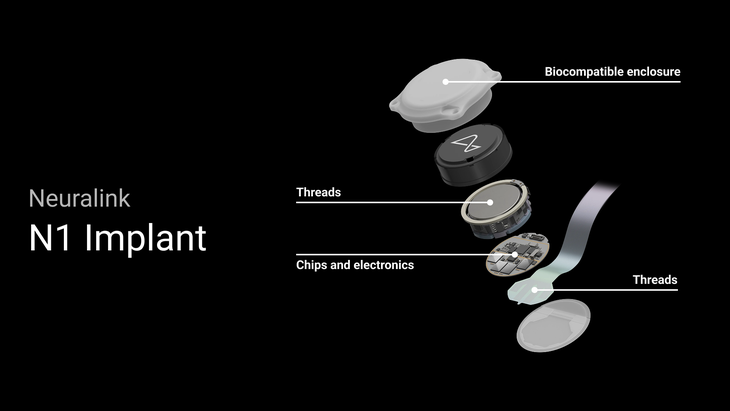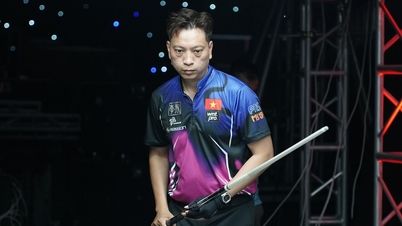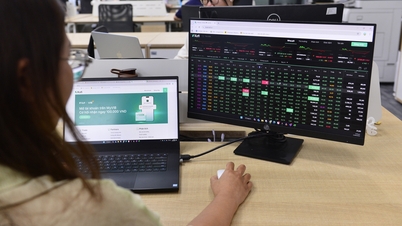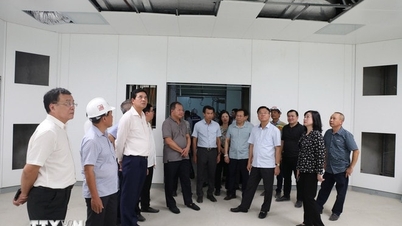
Image depicting the structure of the N1 implant device with ultra-thin electrodes, microprocessor chips and a biological shell used to implant into the human brain - Photo: Neuralink
Neuralink is a neurotechnology company founded by billionaire Elon Musk. Since 2016, the company's team of engineers, neuroscientists, and surgeons have been quietly researching a microscopic device: a chip implanted in the brain, with the goal of decoding neural signals and turning thoughts into digital actions.
No longer science fiction
From controlling computers with your mind to restoring vision, Neuralink is ushering in a new era of communication between humans and machines.
In January 2024, Neuralink confirmed that the first human brain chip implant was successful. The patient was a quadriplegic and after recovery was able to control a mouse cursor with just his thoughts, a breakthrough in neural communication technology.
According to the official announcement from Neuralink on the X platform (Twitter), the patient recovered well and can control the computer with high precision through brain signals.
The chip, called Telepathy, is implanted in the motor cortex of the brain, which controls arm and leg movements. The device records signals from neurons, decodes them, and transmits them to a computer or external control device.
Noland, the first patient to receive a Telepathy chip, plays the game Polytopia with just his thoughts - Video : Neuralink
Neuralink develops chip to restore vision to blind people
Going beyond controlling computers with thoughts, Neuralink is developing a brain implant called Blindsight , with the goal of restoring sight to blind people, including those who have completely lost their eyes and optic nerves.
Unlike traditional medical methods, Blindsight does not require real eyes but works by directly stimulating the visual cortex, bypassing the damaged visual organs. If this brain area is intact, the device can transmit visual data directly to the brain, helping the blind person "see" again.
Sharing on the X platform, billionaire Elon Musk affirmed: "The Blindsight device from Neuralink will allow even people who have lost both eyes and optic nerves to see. With the visual cortex intact, it can even allow people who are congenitally blind to see for the first time."
However, he also notes: "The initial resolution will be low, like Atari graphics, but eventually it has the potential to surpass natural vision and allow you to see in infrared, ultraviolet, or even radar wavelengths."
Project Blindsight has now been granted breakthrough device designation by the FDA, a special mechanism designed to shorten the development and clinical testing time of advanced medical devices. Neuralink expects to begin implanting the device in its first patients by the end of 2025.
In preclinical trials in monkeys, Blindsight has shown initial efficacy, while ensuring host safety after implantation.
When machines enter the human brain
While opening up new hope for people with disabilities, brain chip technology also raises many ethical and safety concerns. Inserting electronic devices deep into the human brain is an unprecedented leap in medical history, accompanied by a series of unanswered questions.
Experts warn of risks during the surgery as well as unforeseen long-term effects. One of the biggest concerns is privacy: when brain data, which is considered absolutely private, can be collected , analyzed, even stored and shared.
Not stopping there, researchers also warn of the risk of brain chips being hacked , leading to the theft or interference of human neural signals.
Faced with these challenges, many argue that an independent monitoring system and strict ethical and legal standards are needed before this technology can be widely adopted.
The future is still being written
Neuralink and brain chip technology in general are taking the first steps into an unprecedented field in medicine and technology. The ability to control computers with thoughts, or restore sight to the blind, once only existed in science fiction movies, is now gradually becoming a reality.
But with the potential for breakthroughs come significant challenges around safety, privacy, and ethics. As the line between humans and machines blurs, the world will face unprecedented questions, and the answers may define a new era.
Source: https://tuoitre.vn/neuralink-dieu-khien-may-tinh-bang-nao-va-hy-vong-cho-nguoi-mu-2025060210253095.htm































































































Comment (0)